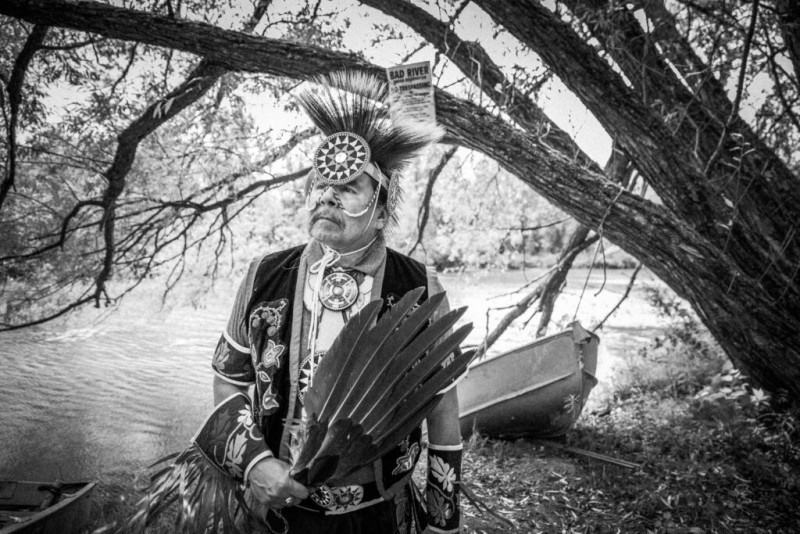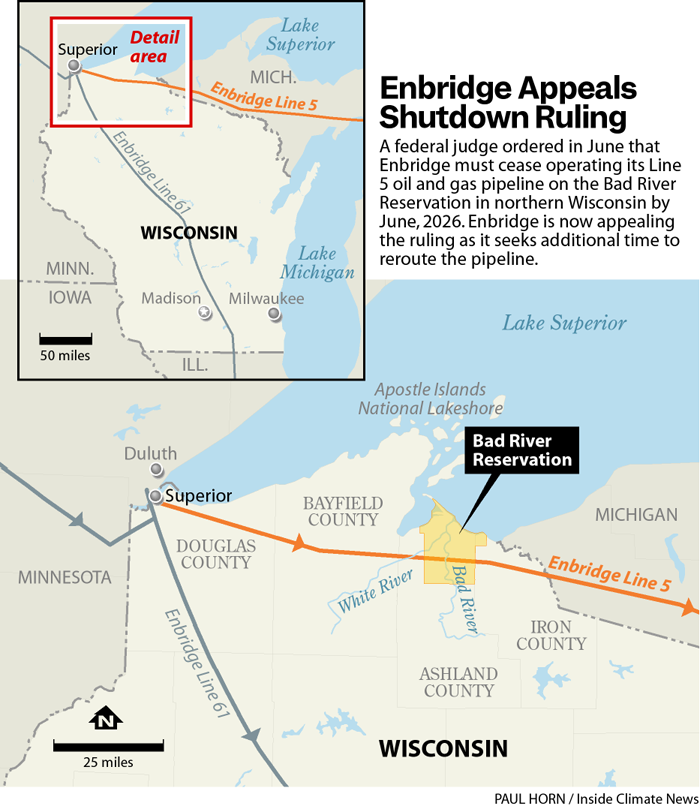Enbridge Wants Line 5 Shutdown Order Overturned on Tribal Land in Northern Wisconsin
Eleven years after easements for a pipeline buried beneath the Bad River reservation in northern Wisconsin expired, five years after the tribe first sounded alarms over the risk of an imminent oil spill into their namesake river and eight months after a federal judge ordered a shutdown, Canadian pipeline giant Enbridge was back in federal court last week arguing that the flow of oil through its 71-year-old Line 5 pipeline be allowed to continue.
“May it please the Court, the district court shutdown order in this case will cause a massive disruption in energy supplies and economies in the Midwest and Canada,” said Alice Loughran, an attorney representing Enbridge before the 7th Circuit Court of Appeals in Chicago on Feb. 8.
Citing a legal argument rarely used in pipeline disputes, Enbridge argued that a 1977 treaty between the United States and Canada prohibited any disruption in the flow of oil between the two countries. Some legal scholars say century-old treaties between the Bad River Band of the Lake Superior Tribe of Chippewa Indians and the U.S. government should supersede the 1977 pipeline treaty and that Enbridge lacks the legal standing to bring a nation-to-nation treaty before the court.
We’re hiring!
Please take a look at the new openings in our newsroom.
See jobs“I think basically it’s a ‘Hail Mary’ from Enbridge,” said Matthew Fletcher, a federal Indian law professor at the University of Michigan and a visiting professor at Harvard University.
The federal district court found Enbridge has been trespassing on the Bad River Reservation since 2013 when the company’s right-of-way easements for the pipeline expired. In January 2017, the Bad River Tribal Council voted not to renew its interest in the right of way and called for the removal of Line 5 because it threatens the tribe’s water resources, food sources and traditional ways of life. However, if the appeals court judges accept Enbridge’s argument—which the Canadian Government is also arguing—the implications could be wide ranging.
“It would really limit the ability of state governments and tribal nations and others to protect the interests that have been widely accepted for many years,” said Debbie Chizewer, an attorney for Earthjustice, an environmental advocacy and litigation organization not involved in the ongoing lawsuit. “If you can’t protect your land from a trespass because of the oil pipelines, what’s the point of having your own land?”
Meanwhile, the tribe’s years-long battle against Enbridge is gaining increasing attention.
Bad River, a film about the tribe and its David-versus-Goliath fight against the pipeline company, was released in theaters across the U.S. on Feb. 15. The film seeks to put the current pipeline fight in an historical context.

“Enbridge’s trespass is one of many in a series of takings of Native land that goes back hundreds of years,” Mary Mazzio, the film’s producer, writer and director, said.
Pat Parenteau, an environmental law professor at the University of Vermont Law School, said the tribe’s opposition to Line 5 raises many of the same issues pursued by the Standing Rock Sioux Tribe of North Dakota in their opposition to the Dakota Access Pipeline (DAPL). Both involve Enbridge oil pipelines that pass under rivers that support the water supply for the tribes and both may hinge on determinations made at the highest levels of government, Parenteau said.
“All those issues are very familiar to us now from the DAPL litigation, which is still ongoing,” he said. “This is DAPL, the Dakota Access Pipeline, revisited.”
U.S. District Judge William Conley gave Enbridge three years, until June 2026, to shut down the 12-mile section of pipe that bisects the Bad River reservation and “arrange reasonable remediation” in a June 23 ruling. The ruling also requires Enbridge to pay more than $5,000,000 to the tribe for past and ongoing trespass.
Line 5 is a 645-mile pipeline from Superior, Wisconsin, to Sarnia, Ontario. The 30-inch diameter pipe transports up to 540,000 barrels per day of crude oil and natural gas liquids. The Bad River Band filed its lawsuit against Enbridge in 2019 after erosion from a severe flood reduced the banks of the Bad River to within 28 feet of the buried pipeline.
In its appeal, the company cited the U.S.-Canada Pipeline Transit Treaty of 1977, which ensures the uninterrupted transmission of hydrocarbons by pipeline between the two countries. The treaty was signed following the 1973 Arab Oil embargo and was designed to safeguard the flow of oil between the U.S. and Canada.
The agreement hadn’t played a role in past pipeline battles until recently. In 2021, Canada invoked the treaty on behalf of Enbridge in its legal battle with the state of Michigan over the same Line 5 pipeline. Line 5 crosses beneath the Straits of Mackinac, a narrow passage of the Great Lakes between Lake Michigan and Lake Huron.
Michigan is suing Enbridge over Line 5, arguing that the exposed section of pipe at the bottom of the Straits is at risk of rupturing.
Invoking the treaty in both the Michigan and Bad River cases may elevate any decision on Line 5 to negotiations between the two countries at a nation-to-nation level and may include confidential arbitration hearings.
The Government of Canada submitted a legal brief in support of Enbridge in its appeal of the Bad River ruling to the 7th Circuit Court of Appeals in September. The brief states that the prior district court shutdown order “violates Canada’s rights under the 1977 Treaty” and “usurps the ongoing Treaty dispute resolution process between the Government of Canada and the Government of the United States.” Canada initiated the treaty’s dispute resolution process in August 2022, according to the brief.
Few are privy to the details of this dispute resolution process, including, it seems, the judges of the 7th Circuit panel.

During the Feb. 8 oral arguments, one of the court’s three judges asked Loughran, the attorney representing Enbridge, whether there was ongoing arbitration between the two countries over the Enbridge pipeline. Loughran said U.S. and Canadian government representatives have “had discussions” as part of the treaty’s dispute resolution process, but added that Enbridge was not aware of what was discussed.
Canada and Enbridge are asking the appeals court to delay any shutdown of the pipeline on the Bad River reservation until the company can secure all necessary permits to reroute the pipeline around the reservation, a process that could take longer than the three years granted in the district court ruling.
“For more than four years, Enbridge has actively pursued a 41-mile re-route of Line 5 around the Bad River Reservation,” Juli Kellner, a spokeswoman for Enbridge, said. “Construction will begin as soon as permits have been received. We are confident the permitting process is moving forward. We don’t intend to operate on the Bad River Reservation a day longer than is absolutely necessary to finish the relocation.”
The U.S. State Department did not respond to a request for comment about potential arbitration between the two countries.
The appeals court has asked the U.S. Government to file a brief in the case and appears eager to hear from the State Department or other federal agencies before making any determination in the case.
“We really would like to hear from the United States,” Judge Frank Easterbrook said during oral arguments.
To date, no federal agency has formally weighed in on the court case or the proposed reroute, which would skirt the southern boundary of the Bad River reservation. However, in a March 2022 letter to the Army Corps of Engineers, an EPA official noted that the reroute “may result in substantial and unacceptable adverse impacts” to the Bad River watershed.
Riyaz Kanji, an attorney representing the tribe, said prior treaties including an 1854 treaty between the U.S. government and the Chippewa Indians overrule the 1977 pipeline treaty.
“It’s well established law that tribal treaty rights can’t be abrogated,” Kanji said.
The 1977 U.S.-Canada pipeline treaty also includes a provision known as “article 4,” that allows government agencies to regulate pipelines for purposes including, but not limited to, environmental protection.
“Article 4, we believe, gives the tribe the authority to regulate the pipeline, both to protect its reservation against trespassers and to protect the environment,” Kanji said. “And that’s exactly what the tribe is doing in saying to Enbridge: ‘You need to get your pipeline off the reservation.’”
The U.S. Bureau of Indian Affairs’ Rights of Way on Tribal Land rule may also provide additional protections to tribes.
“It does require deference to tribal decisions as to whether to grant (or renew) a right of way across tribal lands, including for pipelines,” said Kevin Washburn, dean of the University of Iowa College of Law. Washburn signed the current Rights of Way on Tribal Lands rule into law as Assistant Secretary of Indian Affairs at the U.S. Department of the Interior in 2015.
During the Feb. 8 oral arguments, the judges expressed frustration that no federal agency had weighed in on the case.
Parenteau, of Vermont Law School, said foot-dragging by the EPA, the U.S. Army Corps of Engineers and the Department of Transportation’s Pipeline and Hazardous Materials Safety Administration is likely deliberate as they wait to take their cue from the White House.
“I think this is a State Department-White House decision,” Parenteau said. “I think that’s where the deal is going to go down and then the agencies will fall in line.”
Chizewer of Earthjustice said Enbridge should temporarily and voluntarily press pause on oil and gas shipments through Line 5 until current safety concerns can be addressed.
“A decision by Enbridge to shut down the pipeline now to protect Bad River and the Straits makes a lot of sense while these decisions are playing out.”
Share this article
Disclaimer: The copyright of this article belongs to the original author. Reposting this article is solely for the purpose of information dissemination and does not constitute any investment advice. If there is any infringement, please contact us immediately. We will make corrections or deletions as necessary. Thank you.







